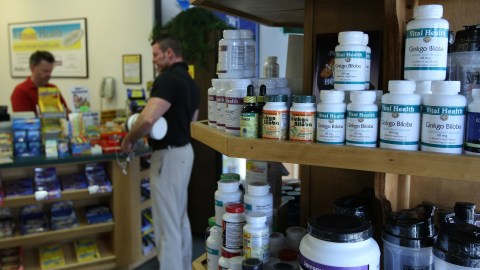Paying for poison: the FDA needs more authority to ban toxic cosmetics and supplements

Clinical trials for new pharmaceuticals are extensive. Research and discovery leads to pre-clinical tests, which then goes through three trial phases, requiring thousands of participants. Once submitted the FDA review process is the next hurdle. Of the thousands of drugs that begin the research phase, only 12 percent even reach Phase 1. The entire process takes an average of ten years at a cost of $2.6 billion per drug.
By contrast, walk into any Whole Foods or nutritional shop and you are exposed to thousands of bottles of pills with virtually no federal oversight. Some of these “supplements” rival pharmaceuticals in strength, with much riskier side effects given they’ve never been scientifically validated. It’s not only the vitamin aisle: cosmetics and weight loss pills containing toxic chemicals bring in billions of dollars every year.
We live in an era where regulatory body budgets are being slashed while important positions are cut. As our longstanding fear of Big Brother is manifesting in the algorithms behind social media and online transactions, we’re paying little attention to products that could use a watchful eye. The real world consequences of supplements and other products, which need intervention and scientific rigor, are potentially creating more health problems than they’re solving, and little is being done about it.
Consider this new paper in Clinical Toxicology. Harvard internist Pieter Cohen is, according to Stat, a “noted supplement detective.” Cohen asked colleagues to investigate six weight loss and workout supplements containing unrecognizable ingredients. Their analysis shows that one stimulant inside these products, DMAA, can cause cardiovascular problems, including heart attacks. While banned by the FDA in 2012, two of the six they tested contain it, albeit under pseudonyms.
Three of the products contain octodrine, which is chemically similar to DMAA. Octodrine was initially developed for bronchitis and laryngitis, first approved by the FDA in 1946 for use through inhalation. Oral usage is riskier; in studies on animals it increases blood pressure and cardiac output, while toxicity studies in cats discovered that it leads to vomiting and convulsions.
Dosage matters. One product includes twice the amount used in asthma treatment. Game Day is marketed as “Perfection. One dose Hits Harder, Works Faster, Performs Longer, and Mixes Better than we could’ve hoped for.” Another pill contains a mixture of stimulants, which Cohen says presents its own problem given that researchers are ignorant of the effects of such a combination. Among other things, this product, Simply Skinny Pollen, is marketed for use “Dissolving and Flushing Out Fat.”
I’m not sure how one dissolves and flushes fat, nor why these companies feel the need to capitalize so many words, but scientific integrity is not part of the pitch. Weight loss and workout supplements aren’t the only industries to escape FDA scrutiny. A year ago the FTC had to step in to regulate homeopathy claims, which is another industry built on suspect ingredients with bold claims showing no rigorous trial validity.
Thing is, since these manufacturers don’t need to adhere to many guidelines, or even comply to the ones that exist, there’s no reason to test their products. Many show no better results than the placebo effect, yet rake in billions of dollars every year—as does the cosmetics industry, whose manufacturers continue to produce hair dyes containing lead acetate.
As the editors of Scientific American write, it is usually only a public outcry that raises suspicions inside of the agency. The problem begins with the Federal Food, Drug, and Cosmetic Act, passed in 1938, of which the editors write,
The law requires no specific tests before a company brings a new product with a new chemical to market, and it does not require companies to release whatever safety data they may collect.
Thus rows and rows of products containing formaldehyde—nearly one-fifth of all cosmetic products!—as well as phthalates, parabens, and triclosan. My wife recently pointed out that she has a tough time finding nail polish and remover without toxic chemicals, which makes no sense given how porous our fingernails and toenails are. We’re willingly mainlining neurotoxins into our bloodstream. The editors continue:
At exposures typical of cosmetic users, several of these chemicals have been linked to cancer, impaired reproductive ability and compromised neurodevelopment in children.
Consumers should not be required to lug a dictionary—ok, open a dictionary app on their phones—every time they want to understand ingredients. We know ourselves: we’ll fall for the bright shiny “all natural” label without understanding that term is effectively meaningless. Regulations on most terminology is suspect. So medical hucksters pimp green tea diet pills during prime time and we order away, unconcerned with those multisyllabic medical-sounding terms dominating the label.
A market isn’t free if its products are sickening and even killing consumers—that’s a heavy price to pay for freedom. We might fear Big Brother, but the fear of illness from toxic chemicals should override those concerns. Government isn’t useless, as many politicians like to claim. We need them to legislate the products we put inside and outside of our bodies.
—
Derek is the author of Whole Motion: Training Your Brain and Body For Optimal Health. Based in Los Angeles, he is working on a new book about spiritual consumerism. Stay in touch on Facebook and Twitter.





